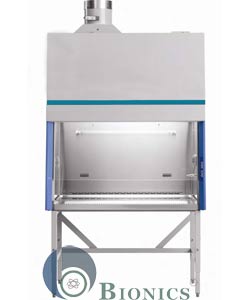The Growing Craze About the Biosafety Cabinets
The Growing Craze About the Biosafety Cabinets
Blog Article
Enhancing Laboratory Safety with Class 2 Biosafety Cabinets and Microbiological Protection

In today’s scientific and clinical labs, safety for personnel and samples is non-negotiable. Whether it's handling live pathogens or sensitive diagnostics, biosafety cabinets play an integral role in contamination prevention and sample integrity.
Of all types, Class 2 cabinets are most commonly used due to their efficiency and versatility. These units are essential for labs working with infectious materials or clinical diagnostics.
Understanding Biosafety Cabinets
Biosafety cabinets are airflow-controlled workspaces engineered for microbiological safety. They use advanced filters to trap harmful particles before air re-enters the lab.
These units are generally classified into three main types: Class I, II, and III based on containment level. Among these, Class 2 biosafety cabinets are the standard choice for most applications.
What Are Class 2 Biosafety Cabinets?
Class 2 Biosafety Cabinets ensure safety on all fronts—personnel, workspace, and biological material. They utilise downward laminar airflow within a sealed system.
Air is treated using dual filtration systems to ensure safe circulation and exhaust. These cabinets are ideal for work involving moderate-risk pathogens (BSL-2/3).
Essential Features of Class 2 Safety Cabinets
A Class 2 microbiological safety cabinet includes several advanced features such as:
• High-efficiency air filters to ensure clean workspace air
• Uniform downward airflow to protect the sample zone
• Inward airflow to keep aerosols contained
• Built-in UV sterilisation for decontaminating surfaces
• Quiet operation and ergonomic design for user comfort
• Front glass for Class 2 Biosafety Cabinets full control and protection
These elements create a clean, contained, and user-friendly workspace.
Applications in Research and Healthcare
Class 2 Biosafety Cabinets are key equipment in healthcare, molecular biology, and quality control. They are critical for DNA/RNA extraction, pathogen culture, and molecular assays.
Whether in hospitals or drug manufacturing, these units are essential for clean procedures.
Advantages of Installing Class 2 Cabinets in Your Lab
Using Class 2 cabinets offers multiple advantages including operator protection and experimental reliability:
• Protects the integrity of lab work
• Acts as a barrier between user and biohazard
• Ensures filtered air is safe for release or recirculation
These cabinets support biosafety goals while improving lab productivity.
Design and Compliance Standards
Top manufacturers build Class 2 cabinets in accordance with strict international guidelines. Class 2 units are sub-classified as A1, A2, B1, and B2—each with distinct airflow and exhaust features.
• Type A2: Most commonly used cabinet model
• Type B2: Used for hazardous vapors and chemicals
Selecting the right configuration ensures compliance and safety.
Choosing the Right Biosafety Cabinet
Before purchasing, consider:
• The types of agents and materials handled
• Available lab space and utility infrastructure
• Operational costs and technical support options
• Manufacturer reputation and post-sale support
Consulting with experts ensures the cabinet fits both budget and compliance goals.
Installation and Safety Guidelines
For optimal results:
• Install the cabinet in a draft-free, low-traffic zone
• Ensure annual certification and airflow testing
• Ensure operators follow best practices
Operational best practices include:
• Maintain biosafety gear protocols
• Work calmly to prevent airflow disturbances
• Decontaminate surfaces before and after use
• Treat UV usage as an overnight sterilisation method
Final Thoughts on Class 2 Biosafety Cabinets
Class 2 biosafety cabinets are a cornerstone of any safe, efficient laboratory. They safeguard both research outcomes and operator health.
From clinical research to vaccine development, Class II cabinets copyright the highest biosafety levels. When investing in a biosafety cabinet, choose performance and reliability over cost-cutting—because your research deserves the best protection. Report this page